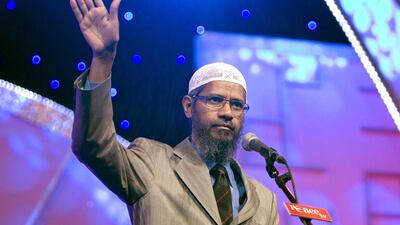Zakir Naik, a television personality whose Peace TV stations have been fined for hate speech in the UK, has been excluded from the charity that has bankrolled the troubled broadcasting operation.
Britain’s charity watchdog has appointed an interim manager to run Islamic Research Foundation International due to an investigation over its funding of television channels which have been fined by the country’s media regulator Ofcom.
Mr Naik, who founded the charity, ran two television stations, Peace TV and Peace TV Urdu, which were fined £300,000 (Dh1.4 million) in May by the media regulator, for broadcasting hate speeches and incitement to commit murder.
Both stations surrendered their licences last November and no longer broadcast in Britain.
Mr Naik was barred from the UK in 2010 but continued to operate the channels until last year.
The Charity Commission launched an investigation in April to examine the operations of IRFI.
This week it announced all its trustees would be excluded from its management.
“The Commission opened a statutory inquiry into the charity in April to examine concerns about its administration and governance, including trustee decision-making around continuing to fund Peace TV channels despite breaches of Ofcom’s Broadcasting Code,” it said.
“The regulator continues to have serious concerns about the administration of the charity. It therefore exercised its powers under the Charities Act 2011 to appoint an interim manager, Virginia Henley, in July.
“Her role will be to take on the running of the charity to the exclusion of its trustees including acting as manager of the charity’s property and affairs. She will also be tasked with considering the future viability of the charity.”
The watchdog appoints interim managers as a temporary and protective measure when it has identified misconduct or mismanagement in the administration of a charity.
The Commission’s inquiry is focusing on why the charity has continued to fund Peace TV channels following repeated broadcasting breaches due to hate speeches and hosting radicals and extremist speakers in the past four years.
The satellite channels, which had claimed to reach two million viewers, were funded by the IRFI, which made appeals to the Muslim audience to contribute to fundraising.
Mr Naik, who is based in Malaysia, has been excluded from travel to the UK, India and Bangladesh and is accused by the Indian government of laundering £23m (Dh109.3m).
Britain barred him from entering the country in 2010, citing “unacceptable behaviour”, although officials have never spelled out the nature of the behaviour.
In June the UK’s counterextremism tsar, Sara Khan, called on the British government to urgently overhaul its terrorism legislation to ensure extremists cannot exploit gaps in the law.
The Commission for Countering Extremism cited Mr Naik’s actions as an example of the current laws failing to tackle Islamist extremism.
It has led to a review of the powers available to the authorities to take action against acts of hate.


